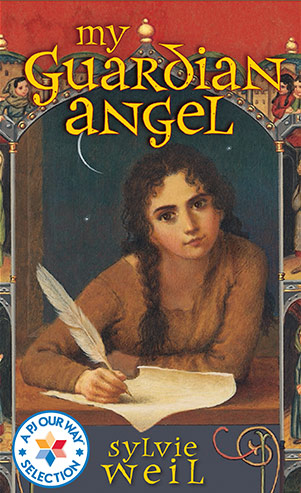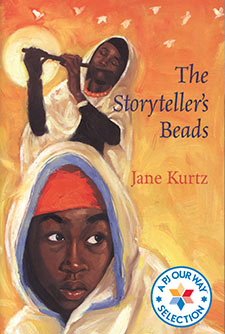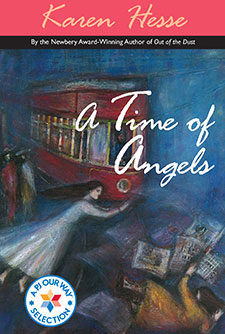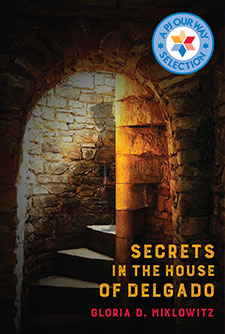My Guardian Angel
Elvina is a clever twelve-year-old girl who lives in medieval France. She can handle pretty much anything, but she’s hiding a dangerous secret. Will she confide in her famous grandfather, Rashi, or will she have to figure things out for herself?
Average Rating
( hint: Login to leave a review! )
10 Reviews
Leave Review
What the Book is About
Jewish Content & Values
Positive Role Models
Content Advisory
Talk it Over!
More for You
What the Book is About
Elvina, twelve-year-old granddaughter of Rashi (Solomon ben Isaac of Troyes, France, the famous Bible commentator), loves to write and read – rare interests for a girl in 11th century France. She is helping to hide a young, injured Crusader soldier who would rather be a scholar than a fighter. This could potentially be catastrophic for the Jewish community which is living under the shadow of the Crusader leader, Peter the Hermit, a fearful man with a reputation of violence.
Translated from the French, and winner of the illustrious Prix Sorciéres, this beautifully written story switches from first person to third when Elvina shares her thoughts and dreams with “Mazal,” her guardian angel. The danger and suspense will appeal to kids, and many will be intrigued (and probably indignant!) by antiquated gender role differences described throughout the story. An historical afterword and glossary complete this lovely work of historical fiction.
Jewish Content & Values
- Readers are introduced to a fictionalized account of Rashi (1040-1105), as well as his students and family, all of whom immerse themselves in Torah study. Many Jewish laws, holidays, anecdotes, and stories are shared in the context of the tale, and the ancient Jewish structure of the teacher and student relationship is also featured here.
- Interfaith dialogue: Although the story takes place during the time of the Crusades, a difficult period between Christians and Jews, Elvina risks her life and that of her community to save a young Christian boy; later, they respectfully discuss their beliefs.
Positive Role Models
- The book portrays Rashi, the famous Bible commentator, as a modern thinker and kind grandfather.
- Elvina is a clever, likeable, and thoughtful girl. She respects her grandfather and loves to learn. She displays courage and confidence when she treats the young Crusader’s wounds and when she saves her brother and cousin from forced baptism.
- Gauthier is a young, peace-loving Crusader who would rather study than fight. As an educated Christian, he displays tolerance and sensitivity in discussing matters of faith.
Content Advisory
Although there are no graphically violent scenes in this book, there are some descriptions of bloody wounds inflicted and sustained by Crusaders; illnesses and the bizarre potions concocted to treat them; and children drinking wine and teenagers marrying and bearing children -- all are age-appropriate and related to the medieval setting.
Talk it Over!
Like many others who lived in medieval times, Elvina, her mother, and her grandmother were all extremely superstitious. They believed in using magic charms and potions to protect their loved ones against bad spirits who would cause them harm. Why do you think they believed in spirits? Why do you think this is a less common belief today?
More for You
Although medieval Jewish women rarely learned to read and write, they were generally educated informally, especially on how to maintain a kosher home. As it became more fashionable for European girls to be educated, some wealthy Jewish families began hiring private tutors to educate their daughters or even sent their daughters away to non-Jewish finishing school. Jewish girls’ education was very limited until the pioneering efforts of Sarah Schenirer (1883-1935), a seamstress from Krakow, who, in 1917, founded Bais Yaakov, the first Orthodox school for girls. The Bais Yaakov schools system continues to flourish today, with hundreds of campuses around the world providing secular and Jewish education to Orthodox and ultra-Orthodox girls.
What the Book is About
What the Book is About
Elvina, twelve-year-old granddaughter of Rashi (Solomon ben Isaac of Troyes, France, the famous Bible commentator), loves to write and read – rare interests for a girl in 11th century France. She is helping to hide a young, injured Crusader soldier who would rather be a scholar than a fighter. This could potentially be catastrophic for the Jewish community which is living under the shadow of the Crusader leader, Peter the Hermit, a fearful man with a reputation of violence.
Translated from the French, and winner of the illustrious Prix Sorciéres, this beautifully written story switches from first person to third when Elvina shares her thoughts and dreams with “Mazal,” her guardian angel. The danger and suspense will appeal to kids, and many will be intrigued (and probably indignant!) by antiquated gender role differences described throughout the story. An historical afterword and glossary complete this lovely work of historical fiction.
Jewish Content & Values
Jewish Content & Values
- Readers are introduced to a fictionalized account of Rashi (1040-1105), as well as his students and family, all of whom immerse themselves in Torah study. Many Jewish laws, holidays, anecdotes, and stories are shared in the context of the tale, and the ancient Jewish structure of the teacher and student relationship is also featured here.
- Interfaith dialogue: Although the story takes place during the time of the Crusades, a difficult period between Christians and Jews, Elvina risks her life and that of her community to save a young Christian boy; later, they respectfully discuss their beliefs.
Positive Role Models
Positive Role Models
- The book portrays Rashi, the famous Bible commentator, as a modern thinker and kind grandfather.
- Elvina is a clever, likeable, and thoughtful girl. She respects her grandfather and loves to learn. She displays courage and confidence when she treats the young Crusader’s wounds and when she saves her brother and cousin from forced baptism.
- Gauthier is a young, peace-loving Crusader who would rather study than fight. As an educated Christian, he displays tolerance and sensitivity in discussing matters of faith.
Content Advisory
Content Advisory
Although there are no graphically violent scenes in this book, there are some descriptions of bloody wounds inflicted and sustained by Crusaders; illnesses and the bizarre potions concocted to treat them; and children drinking wine and teenagers marrying and bearing children -- all are age-appropriate and related to the medieval setting.
Talk it Over!
Talk it Over!
Like many others who lived in medieval times, Elvina, her mother, and her grandmother were all extremely superstitious. They believed in using magic charms and potions to protect their loved ones against bad spirits who would cause them harm. Why do you think they believed in spirits? Why do you think this is a less common belief today?
More for You
More for You
Although medieval Jewish women rarely learned to read and write, they were generally educated informally, especially on how to maintain a kosher home. As it became more fashionable for European girls to be educated, some wealthy Jewish families began hiring private tutors to educate their daughters or even sent their daughters away to non-Jewish finishing school. Jewish girls’ education was very limited until the pioneering efforts of Sarah Schenirer (1883-1935), a seamstress from Krakow, who, in 1917, founded Bais Yaakov, the first Orthodox school for girls. The Bais Yaakov schools system continues to flourish today, with hundreds of campuses around the world providing secular and Jewish education to Orthodox and ultra-Orthodox girls.





